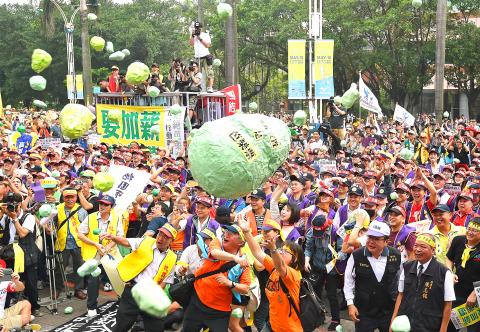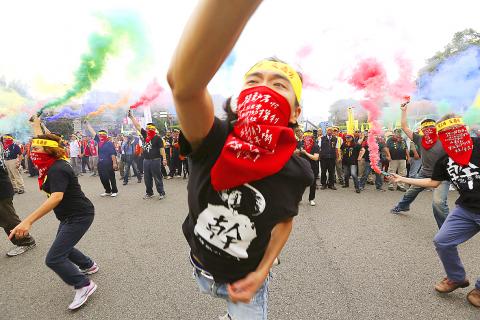Tens of thousands of labor union members and workers from various industries yesterday braved intermittent rain and took to the streets in Taipei on International Workers’ Day, demanding an immediate end to overwork, long working hours, stagnant salaries and the employment of temporary workers.
Holding flags and signs outlining their demands, more than 10,000 nurses, police officers, firefighters, migrant workers, flight attendants, pilots, teachers and finance workers gathered along Ketagalan Boulevard in front of the Presidential Office Building yesterday afternoon to protest against work exploitation and accuse the government of having turned a blind eye to their predicaments.
“We workers are no fools,” Taiwan Confederation of Trade Unions director-general Chuang Chueh-an (莊爵安), the leader of the rally, told the large crowd of protesters.

Photo: Liao Chen-huei, Taipei Times
“The government has rolled out several draft bills concerning basic-level employees since the nine-in-one elections and the awakening of civic groups last year … but without a stiff penalty and a government agency overseeing corporations, these bills will only end up creating more loopholes for employers,” Chuang said.
Singling out amendments to the so-called “four laws for pay raises” recently proposed by the Chinese Nationalist Party (KMT), Taoyuan County Confederation of Trade Unions chairman Chuang Fu-kai (莊福凱) said that even if the four draft bills were passed, they would still not be binding on corporations because there were no penalties stipulated for non-compliance.
“If corporations refuse to negotiate with labor unions and workers, there is nothing the government can do about it,” Chuang Fu-kai said. “These draft bills are just another ‘guava check’ issued by the government and legislators that aims only to attract votes and does workers no good.”

Photo: Reuters
Guava check (芭樂票) is a common colloquial Taiwanese term used to refer to bounced checks or broken promises.
Chuang Fu-kai was referring to draft amendments to the Company Act (公司法), the Factory Act (工廠法), the Labor Standards Act (勞動基準法) and the Small and Medium Enterprises Development Act (中小企業發展條例).
If passed, they would require companies to distribute profits, if any, to employees in the form of pay increases and bonuses. Tax cuts would also be provided for firms that offer salary increases to their employees.
Walking at the head of the rally — which set out from Ketagalan Boulevard at about 2pm and ended in front of the Legislative Yuan at about 3:30pm — were medical personnel, firefighters, police officers, flight attendants and foreign workers, because they are commonly perceived as the most exploited groups of employees in the nation.
A 23-year-old nurse, who wished to be identified only by her surname Chang (張), said there was a time during her previous employment at the Taipei Veterans General Hospital’s Hsinchu Branch that she passed out after her heavy workload allowed her to consume only a bottle of juice the entire day.
“Most of the time, only two nurses were on duty in the emergency department due to a severe personnel shortage. Not only were our health and well-being in jeopardy because of this, but also the lives of our patients,” Chang said.
Another 23-year-old hospital nurse, named Huang Yi-hsuan (黃奕萱), said her job often required her to work 16 hours straight and that she has been rushed to an emergency room three times since she started her current job due to exhaustion.
“Hospital authorities never understand the amount of pressure and work we face on a daily basis. All they care about is profit,” Huang said, adding that she was thinking about finding a less stressful job in the medical aesthetics industry.
A 28-year-old man surnamed Chen (陳), who identified himself as the close acquaintance of a police officer, said that because of staff shortages, police officers suffer from working hours that last as long as 12 hours a day and add up to 88 hours a month.
“Police work requires a high level of focus and often involves dangerous tasks. Having them work long hours is as hazardous as asking an exhausted surgeon to perform a delicate, complex surgery,” Chen said.
After arriving in front of the Legislative Yuan, protesters pelted papier-mache guavas toward the building in a symbolic gesture of giving back the “guava checks” to lawmakers.

The CIA has a message for Chinese government officials worried about their place in Chinese President Xi Jinping’s (習近平) government: Come work with us. The agency released two Mandarin-language videos on social media on Thursday inviting disgruntled officials to contact the CIA. The recruitment videos posted on YouTube and X racked up more than 5 million views combined in their first day. The outreach comes as CIA Director John Ratcliffe has vowed to boost the agency’s use of intelligence from human sources and its focus on China, which has recently targeted US officials with its own espionage operations. The videos are “aimed at

STEADFAST FRIEND: The bills encourage increased Taiwan-US engagement and address China’s distortion of UN Resolution 2758 to isolate Taiwan internationally The Presidential Office yesterday thanked the US House of Representatives for unanimously passing two Taiwan-related bills highlighting its solid support for Taiwan’s democracy and global participation, and for deepening bilateral relations. One of the bills, the Taiwan Assurance Implementation Act, requires the US Department of State to periodically review its guidelines for engagement with Taiwan, and report to the US Congress on the guidelines and plans to lift self-imposed limitations on US-Taiwan engagement. The other bill is the Taiwan International Solidarity Act, which clarifies that UN Resolution 2758 does not address the issue of the representation of Taiwan or its people in

US Indo-Pacific Commander Admiral Samuel Paparo on Friday expressed concern over the rate at which China is diversifying its military exercises, the Financial Times (FT) reported on Saturday. “The rates of change on the depth and breadth of their exercises is the one non-linear effect that I’ve seen in the last year that wakes me up at night or keeps me up at night,” Paparo was quoted by FT as saying while attending the annual Sedona Forum at the McCain Institute in Arizona. Paparo also expressed concern over the speed with which China was expanding its military. While the US

SHIFT: Taiwan’s better-than-expected first-quarter GDP and signs of weakness in the US have driven global capital back to emerging markets, the central bank head said The central bank yesterday blamed market speculation for the steep rise in the local currency, and urged exporters and financial institutions to stay calm and stop panic sell-offs to avoid hurting their own profitability. The nation’s top monetary policymaker said that it would step in, if necessary, to maintain order and stability in the foreign exchange market. The remarks came as the NT dollar yesterday closed up NT$0.919 to NT$30.145 against the US dollar in Taipei trading, after rising as high as NT$29.59 in intraday trading. The local currency has surged 5.85 percent against the greenback over the past two sessions, central